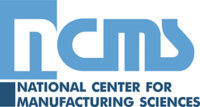CTMA Project #: 140385
Problem: Today, valuable information lies buried inside individual machine controls on the shop floor. Extracting information from these isolated islands is difficult and time consuming. Lean staffed, multi-shift operations make it difficult for operating personnel to maintain an accurate situational awareness from one shift to the next. Maintenance personnel receive scant advance warning and are called to diagnose faults based on a filtered verbal explanation of the problem. Loss of older experienced personnel causes a loss of institutional knowledge. Upstream processes (design) often don’t receive feedback from downstream processes (manufacturing). The cost/benefit ratio to attempt to gather, compile, and analyze this buried information using conventional means is too high.
As a result, operating, support, and management personnel are left to make decisions based on incomplete and subjective information. Problems and inefficiencies remain hidden. Opportunities for “continuous improvement” are not realized because the supporting facts are not known.
Benefit:
- Availability:
- 40% productivity improvements demonstrated.
- Greater throughput results in better parts availability and therefore reductions in maintenance cycle time.
- Cost:
- Increased shop efficiency reduces non productive time and its cost.
- Schedule preventive maintenance reduces cost.
- Reliability:
- Healthy machines produce more reliable products.
- Cycle Time:
- Awareness and analysis tools enable improvements in asset utilization.
- Improved asset utilization results in greater throughput and reduced cycle times.
Solution/Approach: This smart machine project will equip different selected machines at project partners’ sites with the capability to automatically gather and report their performance in a consistent fashion. The cost/benefit ratio to gather and compile this information is radically changed for the better.
The team will:
- Begin this Pilot Project by first documenting the project partners’ selected machines’ existing interfaces to production execution, process engineering, and maintenance support functions.
- Implement proof-of-concept “Smart Machine” capabilities and infrastructure for these machines, focused on the maintenance support functions.
- Gather data and experience at each site during an initial usage period.
- Develop strategies and enhancements for these machines’ connections to the maintenance support function.
- Demonstrate selected enhancements; gathering additional data and experience at the sites during a subsequent usage period.
- Deliver report final results in February of 2005. This will include definition of specific, achievable objectives for subsequent project phases and/or follow-on Next Generation Depot and Smart Machine Platform Initiatives.
The characteristics of a smart machine include the following:
- Knows its capabilities/condition and can be interviewed.
- Knows how to machine a part in an optimal manner.
- Monitors, diagnoses, and optimizes itself.
- Knows the quality of its work.
- Learns and improves over time.
This proof-of-concept demonstration deploys sensors and autonomous computer processes to support basic machine tools and manufacturing processes. The interfaces, data structures, and data transfer mechanisms will utilize/advance open-source industry standards to assure the broadest plug-and-play functionality for the mix of new and legacy equipment from different manufacturers in a typical shop. The resulting smart machine infrastructure of autonomous computer processes will log data, take independent action, learn, and interact with operating, support, and management personnel. The demonstration will show how smart machines facilitate making parts better, faster, and at less cost.
DOD Participation:
- U.S. Air Force
- WR-ALC machine shop
- OO-ALC machine shop
- U.S. Army
- RRAD rubber shop
- ANAD machine shop
- U.S. Navy
- PHNSY machine shop
Industry Participation:
- Sikorsky
- Vought
- MAG Industries/Cincinnati Machine
- NCMS




